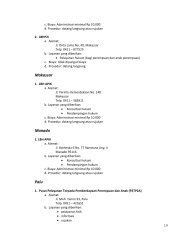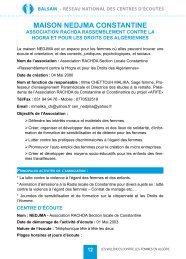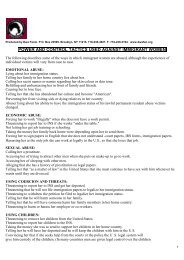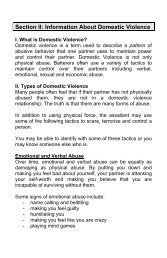Domestic Violence Counseling Manual - Hot Peach Pages
Domestic Violence Counseling Manual - Hot Peach Pages
Domestic Violence Counseling Manual - Hot Peach Pages
Create successful ePaper yourself
Turn your PDF publications into a flip-book with our unique Google optimized e-Paper software.
the first weeks after an assault, prefer to avoid even simple touching even from those<br />
they love and trust.<br />
• Listening reflectively (very important!)<br />
When you hear conflicting or contrasting feelings in the counselee, let her know that you detect<br />
them. Often people are so caught up in their problems, that merely clarifying their feelings helps.<br />
Feeding back the counselee’s own words for verification accomplishes a number of important<br />
things, such as:<br />
• Retaining ownership of the problem for the counselee<br />
• Making sure you and your counselee are on the same page as to what the situation is<br />
• Showing that you are actually listening<br />
• Helping the counselee to look at her situation from a removed, objective viewpoint<br />
Some tips for good reflective listening: listen for feeling words, pay attention to non-verbal cues<br />
like tone of voice, silence, murmuring, and crying; use as many different feeling words as you can<br />
BAD LISTENING SKILLS<br />
• Jumping to conclusions/Making assumptions<br />
Remember, ask questions if you need clarification. Try not to jump to conclusions by supplying<br />
and assuming details that the counselee hasn’t provided you with.<br />
• Making unfeasible promises<br />
Never give false hope or false encouragement. Avoid comments such as “Cheer up, everything<br />
will be better soon.” In reality, it is impossible to know if a situation will, in time, be better (or<br />
worse). Do, however, reassure the counselee that the problem is solvable.<br />
• Putting words in someone’s mouth<br />
Try not to be too pushy with your own thoughts, it’s key that the counselee feel that she is in<br />
control and that she want to enact the solution the two of you come up with.<br />
• Lecturing<br />
Listening is a process of helpful communication, not a lecture. Be prepared to become involved<br />
of the flow and intensity of the counselee’s feelings. <strong>Counseling</strong> is not about projecting what you<br />
want onto the counselee but about helping the counselee achieve their own goals.<br />
• Judging/Blaming<br />
Your attitude should be one of care and acceptance of the counselee for what she is, realize that<br />
your own personal norms and values may be detrimental to finding an effective solution and<br />
establishing rapport.<br />
51-56

















